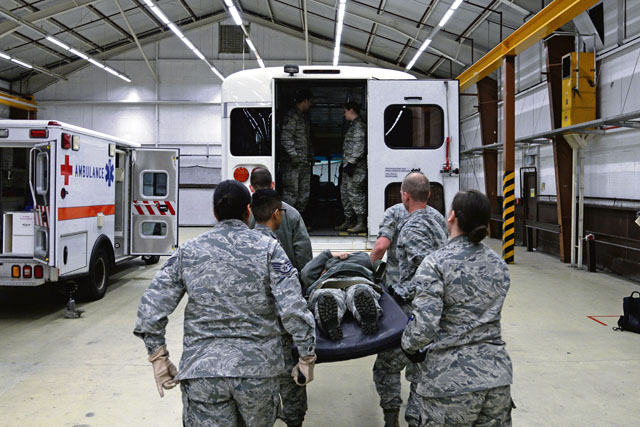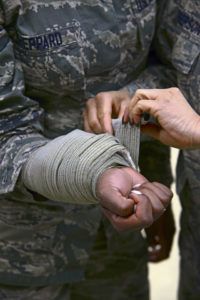
All offices of the 86th Medical Group closed their doors March 22 for more than 800 medical personnel to attend hands-on training in one of Ramstein’s many hangars.
“Once a month we have a training day here in the medical group,” said Chief Master Sgt. Rachel Clark, 86 MDG superintendent, “and as key leaders it’s our responsibility to ensure that all of our members are organized, trained, and equipped to fulfill mission requirements.”
Monthly training ensures all assigned personnel meet the standard of readiness required by their specific job codes.
“This was the first time we did it this particular way,” said Clark, “and we’re going to do it again because it was so successful.”
The “rodeo” lead Airmen through a series of training circuits refreshing everyone’s memory on some of the basic medical skills that could be lost during the day-to-day technical aspects of the job.

“Recently, just with scheduling issues we’ve had to move our training days around so they aren’t always on a consistent day,” said Capt. Jackson, 86 MDG medical readiness flight commander. “We had the rodeo in order to kind of give everyone a chance to get out of the medical group, go out and train on these basic medical skills.”
The ancillary services were a big part of the rodeo, said Clark, although they’re not trained to do patient care like a medic, they can lift and move patients but treatment isn’t a part of their skill set.
“Anyone can do manpower regardless,” said Clark, “but we try to keep all of our doctors, nurses and technicians in positions to save the lives with hands-on treatments for the patients.”
Although it may look different seeing Airmen teaching officers, Clark said rank doesn’t matter. Everyone in training is considered a medic. Although some have different skill sets and different professions, rank is not a factor when it comes to medicine for us.
“What we have to do is ensure that our providers and all of the technicians are competent in that skill set,” said Clark, “to be able to perform care to mitigate any risk or harm for our patients.”
In a high-stress, emergency environment it’s imperative everyone on the team understands their role to limit additional tension and confusion during adverse situations.
“We render care in deployed locations,” said Clark. “So what we do in garrison is practice how to do all of the things we would do in a deployed setting. What that means is pulling all of your resources and all of the things that we would do in that location and just kind of pretend we’re doing it in the field.”
Although it may inconvenience base populous to close the entire medical group for a day of training, the training is essential to mission readiness and success.
It’s always a double-edged sword having a training day, said Jackson. Training is important because readiness is indispensable. And shutting the clinic down at times is necessary to ensure readiness standards are being met throughout the group.
“I think the most important take away for the general public is, even though we’re really good at our day-to-day jobs, what we do down range can be different,” said Jackson. “So we need time to train on that as well because when we do deploy we’re ready to help take care of those people down range.”


